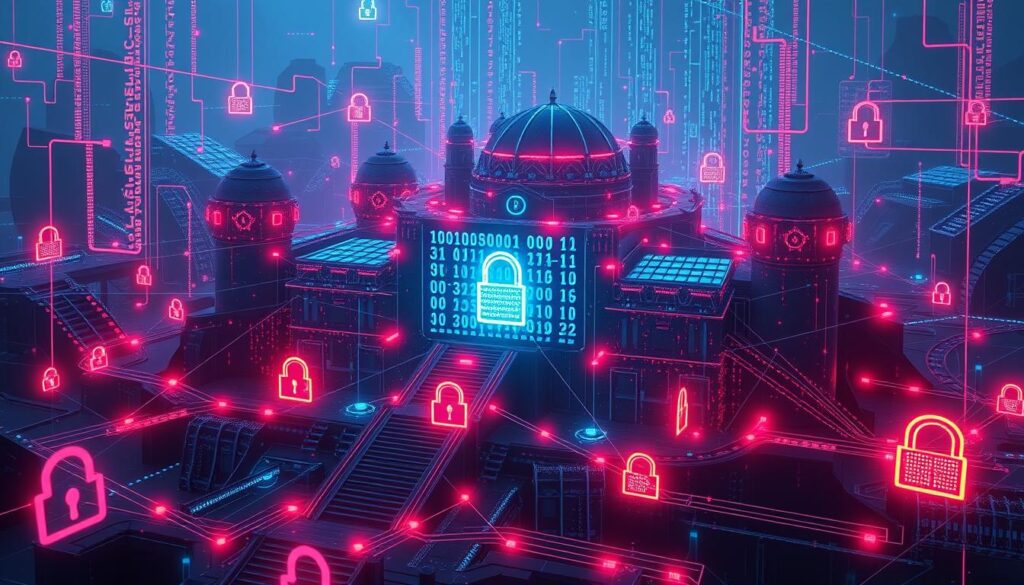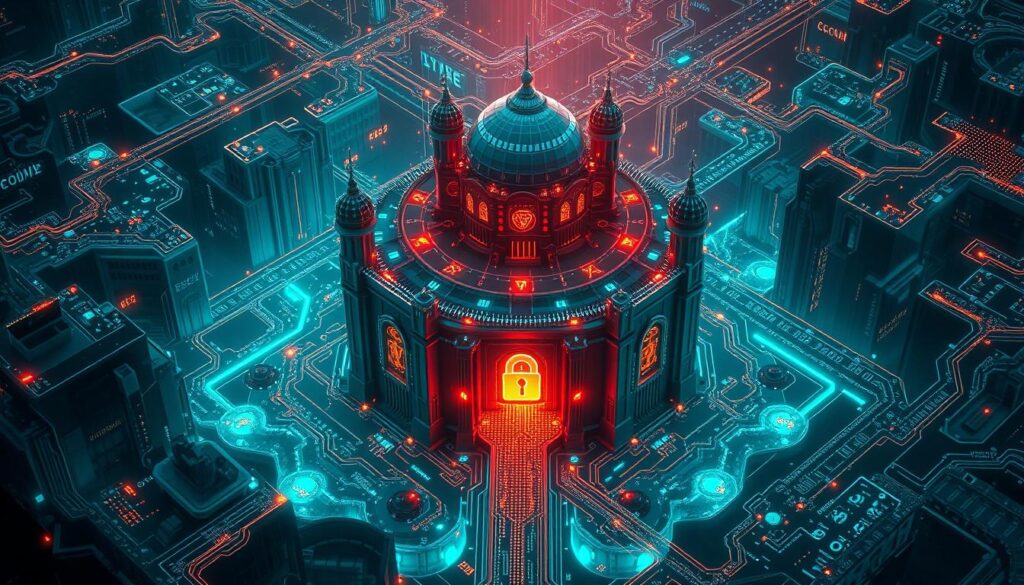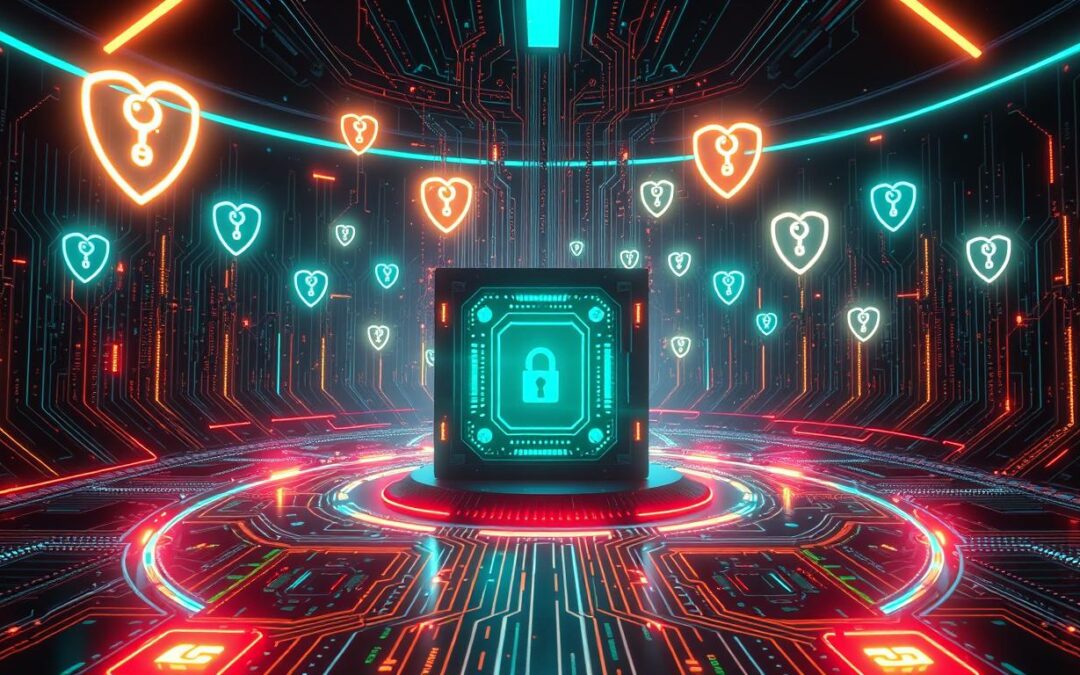In today’s digital world, keeping your online accounts and personal info safe is key. Over 80% of data breaches happen because of weak or stolen passwords. So, using strong passwords and two-factor authentication is crucial to stop automated attacks. Also, keeping your software up to date helps a lot in keeping your network secure.
Cybersecurity is about keeping your sensitive info safe and stopping data breaches. By using strong cybersecurity steps, you can lower the chance of cyberattacks. This means your digital stuff stays safe. Good cybersecurity habits, like encrypting data and teaching employees, can really cut down on risks.
Key Takeaways
- Implementing two-factor authentication can block up to 99.9% of automated attacks
- Regular software updates can significantly reduce vulnerabilities
- Encrypting sensitive information can protect against approximately 90% of data theft incidents
- Training employees in cybersecurity best practices can lead to a 70% decrease in risky behaviors and potential breaches
- Strong password management practices are essential for preventing data breaches
- Cybersecurity incidents can have significant financial implications, with the global average cost of a data breach being $4.45 million
Understanding the Fundamentals of Cybersecurity
Cybersecurity is a complex field that protects digital information. It ensures the data protection and information security of people and companies. Digitdefence says knowing the basics is crucial to fight digital threats.
A key idea in cybersecurity is the CIA triad. It stands for confidentiality, integrity, and availability. These are vital for keeping digital info safe.
Core Components of Digital Security
Key parts of digital security include firewalls and intrusion detection systems. Encryption is also important. Together, they block unauthorized access and fight cyber threats.
The CIA Triad: Confidentiality, Integrity, and Availability
The CIA triad is a core idea in cybersecurity. It ensures digital info is kept safe. Confidentiality means keeping sensitive info private. Integrity means the info is accurate and complete. Availability means the info is accessible when needed.
Common Security Terminology
Knowing common security terms is key in cybersecurity. Terms like malware, phishing, and ransomware are important. Understanding these helps protect against cyber threats and ensures data protection and information security.
Modern Cyber Threats and Attack Vectors
The world of cyber threats is always changing, with new ways to attack appearing daily. Cyber threats include phishing, ransomware, and SQL injection attacks. These can cause huge problems, with data breaches costing up to $4.35 million on average.
Some common cyber threats are:
- Phishing attacks, where scammers pretend to be someone you know to get your info
- Ransomware attacks, where hackers demand money to unlock your data
- SQL injection attacks, which find weak spots in servers to steal data
It’s crucial to know about these cyber threats and protect yourself. This means using strong passwords, enabling multi-factor authentication, and updating your software. By understanding these threats, you can keep your digital world safe and your info secure.
Recent stats show that cyber threats are getting smarter, with 95% of businesses saying phishing has gotten better. Also, 85% of cybersecurity experts think AI is behind the rise in cyberattacks. It’s clear that cyber threats are a big deal. We must stay alert and protect ourselves from these dangers.
Building Strong Password Management Practices
Strong password management is key to good cyber defense and IT security. Weak passwords cause 81% of data breaches. To stay safe, create passwords that mix letters, numbers, and symbols. Or, use a passphrase of 4-7 random words.
Using a password manager boosts security. It helps users create unique passwords for each account. This makes it harder for hackers to get into your accounts. Some benefits of password managers include:
- Generating and storing complex, unique passwords for each account
- Autofilling login credentials for easy access
- Alerting users to weak or reused passwords
Enabling multi-factor authentication (MFA) is also vital. MFA stops 99.9% of account hacks. But, only 30% of users turn it on. Combining strong passwords with MFA makes you much safer.

Good password management is crucial for staying safe online. It’s important to keep your passwords strong and up-to-date. Also, give your team good password managers to help them stay secure.
Securing Your Network Infrastructure
Keeping your online world safe starts with a strong network setup. This means taking steps to guard your data and devices from unwanted access. A key part of this is making sure your router is secure.
Routers act as the first line of defense for your network. If they’re not locked down, hackers can easily get in. So, it’s important to update your router’s software and change its default password.
Also, turn off remote management and use a guest network for your IoT devices. These steps help keep your network safe.
Router Security Best Practices
- Change default passwords and usernames
- Enable WPA2 encryption or the latest WPA3 standard
- Regularly update router firmware
Wi-Fi Protection Measures
Protecting your Wi-Fi is vital for network security. Use strong, unique passwords and make sure WPA2 (or WPA3) is turned on. This boosts your online safety.
Also, using a Virtual Private Network (VPN) adds extra security when you’re online. It encrypts your internet traffic, making it hard for hackers to get your data.
Virtual Private Networks (VPNs)
VPNs are great for keeping your online activities safe. They encrypt your internet traffic, making it hard for hackers to get your data. This is especially important when using public Wi-Fi, which is often not secure.
By using VPNs, you can greatly reduce the risk of data breaches. This helps keep your online world safe and secure.
Data Protection Strategies in the Digital Age
In today’s world, digital security is very important. Cyberattacks and data breaches are common. It’s key to have strong data protection plans to keep information safe.
Recent stats show 60% of businesses faced cyberattacks in 2022. These attacks cost a lot of money and hurt their reputation.
Encryption is a good way to protect data. It stops unauthorized access. Companies using encryption see a 50% less in phishing attacks. Also, regular backups are important. They help recover data in case of a breach or system failure.
By focusing on digital security, we can lower the risk of data breaches. This keeps the trust of our customers and stakeholders.
- Using strong, unique passwords
- Keeping software up-to-date
- Securing networks with firewalls and VPNs
- Regularly backing up data
By following these tips and staying updated on digital security threats, we can keep our information safe. This helps us have a secure online presence.
Social Engineering Defense Tactics
As threats grow, it’s key to have strong social engineering defense tactics. Cybersecurity awareness helps spot phishing, stop identity theft, and train employees. About 85% of companies face social engineering attacks, leading to big financial losses.
For example, the Robinhood attack stole data from 7 million users. A Lithuanian person also stole $100 million from Google and Facebook by pretending to be a vendor. These cases show how vital network security is in fighting these attacks.
To fight social engineering attacks, knowing the attackers’ tactics is crucial. Common tactics include:
- Phishing emails, which make up about 1 in 99 emails worldwide
- Spear phishing attacks, which are five times more successful than regular phishing
- Pretexting scams, which cost over $1.4 billion in 2020
By using strong social engineering defense tactics, companies can lower cyber threat risks. This includes boosting cybersecurity awareness, setting up network security systems, and training employees regularly.
Mobile Device Security Essentials
Mobile devices are now more at risk of cyber threats. This makes data protection and information security very important. With more people working from home, companies face bigger risks of cyber attacks.
Since 90% of companies say their employees use personal devices for work, strong security is needed. This is to keep data safe.
To lower these risks, people can do a few things. For example:
- Managing app permissions to limit access to sensitive data
- Using mobile encryption tools to keep data safe while it’s in transit or stored
- Following safe mobile banking practices, like using two-factor authentication and keeping software current
By focusing on data protection and information security, we can all help fight cyber threats. Keeping software updated, using strong passwords, and enabling multi-factor authentication are good steps. These actions can make mobile devices more secure.
Cloud Security and Data Backup Protocols
Protecting against cyber threats is key in today’s digital world. Using strong cloud security and data backup plans is a good start. Regular backups and updates can stop data loss from cyber attacks. These attacks can be very harmful to both people and companies.
Recent numbers show that a data breach costs about $8.64 million on average. It also takes around 280 days to find, fix, and recover from such a breach.
To lower these risks, having a good backup plan is vital. The 3-2-1 backup rule is often suggested. It means having three copies of data on two different types of storage, with one copy offsite. Cloud-based backups can help with this, offering a safe place for your data and reducing the need for physical media.
Important things to think about for cloud security and data backup include:
* Using firewalls and intrusion prevention systems to guard backup servers
* Making sure only the right people have access to backups
* Testing backup plans regularly
* Adjusting backup frequency, destination, and schedule to fit your business needs
By focusing on cloud security and data backup, you can greatly reduce the chance of cyber attacks. This also helps lessen the damage if a data breach happens.
Implementing Regular Security Audits
Regular security audits are key to keeping your cyber defense and IT security strong. They help find and fix vulnerabilities before they’re used by hackers. This is especially important today, as cybercrime costs are expected to hit $10.5 trillion by 2025.
Security audits check your IT setup, including security rules and controls. They find weak spots and suggest ways to get better. Important parts of security audits include:
- Vulnerability scanning to spot security holes
- Incident response planning for quick action in case of breaches
- Security assessment tools to check your overall security
Companies that do regular security audits can find and fix problems early. This makes their cyber defense and IT security stronger. It also lowers the chance of security breaches and their costs. 
In short, regular security audits are vital for strong cyber defense and IT security. By adding these audits to their security plans, companies can boost their security. They can also lower the risk of security breaches and keep their cyber defense and IT security strong.
Advanced Cybersecurity Technologies and Tools
The digital world is always changing. It’s key to keep up with the latest in cybersecurity to stay safe online. New tools like artificial intelligence and blockchain are making security better.
Here are some top cybersecurity tools and technologies:
- Artificial intelligence in security, which can help detect and respond to threats in real-time
- Blockchain security applications, which can provide a secure and transparent way to store and manage data
- Zero trust architecture, which can help reduce the risk of data breaches by verifying the identity of users and devices
Using these advanced tools can make online safety and digital security better. It helps lower the chance of cyber attacks and data breaches.
It’s important to keep learning and adapting in the fast-changing world of cybersecurity. Knowing the latest trends and technologies helps protect against threats. This way, everyone can stay safe online.
Conclusion: Maintaining Robust Cybersecurity in an Evolving Digital Landscape
In today’s fast-changing digital world, keeping strong cybersecurity is key. The threats we face might seem overwhelming, but the solution is simple. We need to be proactive and use a variety of security measures.
It’s vital for everyone to keep learning and doing security checks often. Knowing the latest cybersecurity news and tips helps us stay ahead of threats. Regular checks, plans for emergencies, and updates to security rules are musts to fight cybercrime.
Creating a culture where everyone knows about security is important. Teaching employees how to spot and handle threats helps a company’s cybersecurity a lot. Working together, we can make the digital world safer for everyone.
Cybersecurity is a never-ending battle, not just a quick fix. By staying alert, flexible, and always looking to improve, we can face the digital world’s challenges with confidence. This way, we keep our data, devices, and online identities safe.

